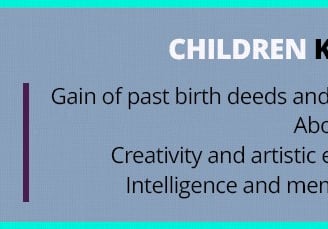Children Chapter
(Chapter 5 – Children, Mantras, Punya Karma, and Creativity)
Definition & Purpose of Chapter 5:
Chapter 5 in Nadi Astrology is dedicated to the native’s children, spiritual merit (Punya karma) from past lives, divine blessings, and creative intelligence. It is derived from the 5th house in Vedic astrology, traditionally known as the Putra Bhava, which governs offspring, wisdom, mantras, past-life merits, and inner creativity.
This chapter helps uncover the soul's blessings, parental destiny, and spiritual tendencies, giving a holistic picture of both worldly and spiritual dimensions of the native’s life.
Key Areas Covered in Chapter 5:
1. Children (Putra Bhagyam)
This is a central theme in Chapter 5, offering deep insights into the native’s potential for having children and the karma linked to them:
Number of children: How many sons or daughters are destined in this life.
Timing of childbirth: Whether there will be delays, early conception, or specific periods of fertility.
Issues in conception: Causes of infertility, miscarriages, or medical complications due to karmic blocks.
Adoption or surrogacy: If natural childbirth is blocked, guidance may be given on alternate parenting paths.
Nature and destiny of children: Physical and mental health, educational prospects, and character of each child.
Karmic relationship: Whether the children bring joy, spiritual connection, or karmic debts to resolve.
This section is extremely helpful for those hoping to become parents or trying to understand child-related challenges.
2. Punya Karma (Past-Life Merits)
This section reflects the positive spiritual credit (punya) earned in previous lifetimes:
Protection and grace received due to prior good deeds, charity, service to gurus, or temple work.
How past virtues and sacrifices are helping the native in this life—through good health, wealth, spiritual opportunities, or protection from accidents or illness.
Past-life efforts that have resulted in current life blessings, such as a strong spiritual family, good children, or natural talents.
How much punya the native carries, and whether it will offset negative karma or bring divine interventions.
This section serves as a mirror of your spiritual bank account, offering perspective on hidden blessings.
3. Mantras, Divine Grace & Spiritual Path
This part explores the spiritual direction and potential of the native:
Favorable deities: Gods or goddesses connected to the native's soul (e.g., Lord Muruga, Devi, Shiva, Vishnu).
Prescribed mantras or spiritual practices: Specific sounds, slokas, or rituals that enhance inner awakening or clear karmic blocks.
Signs of spiritual growth: Whether the native is destined for yoga, meditation, mantra siddhi (mastery of mantras), or even becoming a spiritual guide.
Whether there is divine intervention in their life—moments when divine energy has protected or uplifted them.
The possibility of spiritual visions, dreams, or inner realizations
This section is especially relevant for those who feel drawn to the spiritual path or have had mystical experiences.
4. Creativity and Intelligence
Chapter 5 also examines the creative intelligence (buddhi) of the native:
Artistic talents: Painting, music, writing, acting, or design.
Problem-solving abilities: Intelligence in navigating life challenges, business, or learning.
Whether the native is analytical, intuitive, or innovative in their thinking.
How creativity can influence their career path or spiritual expression.
This reveals whether the native’s mind is a gift from past lives, and how it can be used for both material and spiritual success.
Why Chapter 5 Is Important:
Chapter 5 addresses deep and life-shaping questions, such as:
Will I have children? When, and how many?
Are there karmic blocks to childbirth or parenting?
What are the effects of my past-life punya karma on this life?
Is there divine blessing guiding my life?
Am I spiritually gifted, and what path should I follow?
How can I use my creativity and intelligence for greater purpose?
This chapter provides both worldly insights (regarding children and personal talent) and spiritual revelations, making it one of the most balanced and soul-revealing parts of the Nadi reading.




